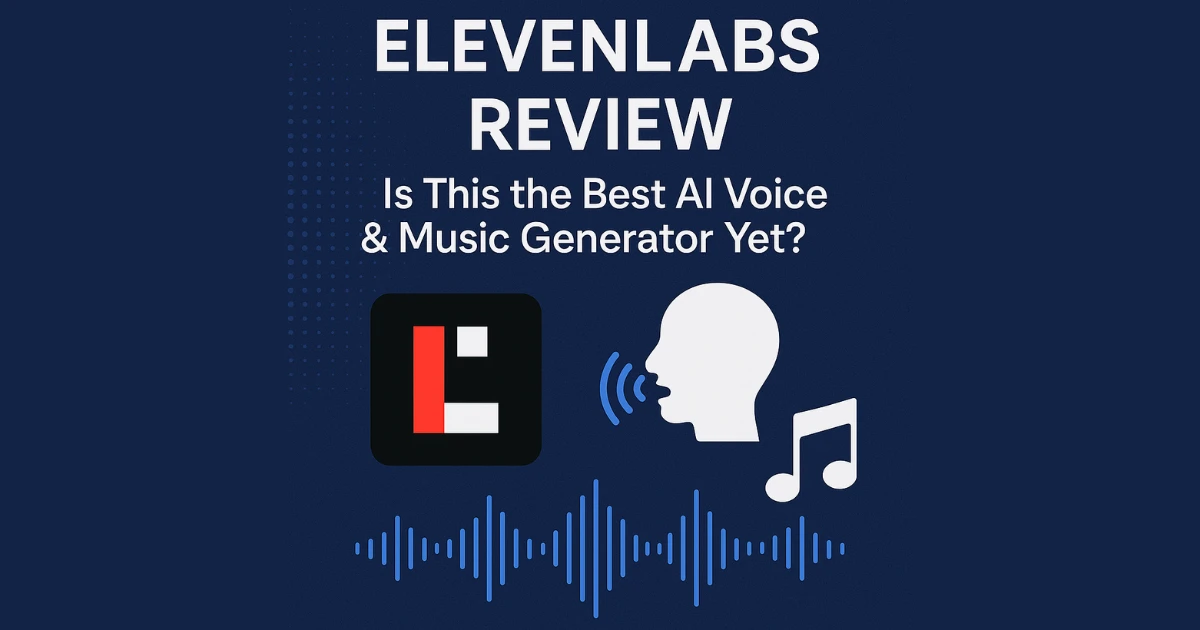As someone who’s been knee-deep in the world of AI tools for over a decade—starting from clunky text-to-speech engines in the early 2010s to today’s hyper-realistic voice models—I’ve seen the landscape evolve dramatically.
In 2025, ElevenLabs stands out as a powerhouse in AI voice generation, blending cutting-edge technology with practical applications that make it indispensable for creators, developers, and enterprises alike.
If you’re searching for an “ElevenLabs review 2025,” you’re likely wondering: Is it still the gold standard for realistic AI voices?
Does it justify the hype amid rising competition? And how does it stack up in features, pricing, and real-world performance?
In this comprehensive review, I’ll draw from my hands-on experience testing ElevenLabs extensively this year, including generating voiceovers for podcasts, cloning voices for custom projects, and even experimenting with their new music features.
We’ll cover everything from core functionalities to the latest 2025 updates, pricing breakdowns, pros and cons, user feedback, and comparisons.
By the end, you’ll have a clear picture of whether ElevenLabs is the right fit for your needs—whether you’re a solo content creator dubbing videos or a business building conversational AI agents. Let’s dive in.
What is ElevenLabs?
ElevenLabs is an AI-driven platform specializing in voice synthesis, making it possible to convert text into lifelike speech, clone voices with uncanny accuracy, dub content across languages, and even generate music from prompts.
Founded in 2022 by two Polish engineers frustrated with poor movie dubbing, the company has skyrocketed to a $3.3 billion valuation by 2025, thanks to over $180 million in funding and innovations that push the boundaries of audio AI.
Their mission? To make content universally accessible in any language and voice, powering everything from audiobooks and podcasts to interactive voice assistants and enterprise applications.
What sets ElevenLabs apart is its focus on emotional depth and realism. Unlike older TTS tools that sounded robotic, ElevenLabs’ models capture nuances like intonation, pauses, and even whispers, making the output feel human.
In 2025, they’ve expanded beyond voices into music generation and advanced conversational AI, positioning themselves as a one-stop shop for audio creation.
If you’ve ever used tools like Descript or Murf AI, ElevenLabs feels like the premium upgrade—more versatile, more natural, and backed by robust APIs for developers.
From my perspective as an SEO expert and content creator, ElevenLabs isn’t just a tool; it’s a game-changer for optimizing multimedia content.
Voiceovers can boost engagement on videos, improve accessibility for global audiences, and even enhance SEO through audio transcripts. But is it perfect? We’ll get into that.
History and Background of ElevenLabs
ElevenLabs’ story is one of rapid ascent in the AI world. Launched in January 2023 with a $2 million pre-seed round, the company quickly gained traction for its breakthrough voice cloning tech. By mid-2023, they’d raised $19 million in Series A, hitting a $100 million valuation.
Fast-forward to early 2025, and a $180 million Series C round catapulted them to unicorn status faster than OpenAI in some metrics. With over 300 team members across six continents, they’ve powered more than 1 million hours of localized audio for major publishers, gaming studios, and Fortune 500 companies.
Key milestones in 2025 include the launch of Eleven v3 (alpha), their most expressive TTS model yet, and Eleven Music in August—a tool for creating studio-quality songs from natural language prompts.
They’ve also rolled out Conversational AI 2.0, featuring multimodality, language switching, and enterprise-grade security like HIPAA compliance.
This evolution reflects a shift from niche TTS to a full audio infrastructure platform, addressing pain points like bad dubbing that inspired its founders.
In my experience reviewing AI tools, this trajectory shows ElevenLabs’ commitment to innovation. They’ve listened to user feedback, iterating on features like low-latency models and multilingual support, which now covers 29+ languages with over 1,000 voices. It’s no wonder they’re integrated into apps used daily by millions.
Key Features of ElevenLabs in 2025
ElevenLabs packs a punch with features that cater to diverse users. Here’s a deep dive into the standout ones, based on my testing and the latest updates.
Text-to-Speech (TTS) Capabilities
At its core, ElevenLabs excels in TTS, converting written text into natural-sounding speech. Their Eleven v3 model (in alpha as of mid-2025) adds emotional depth, making voices convey excitement, sadness, or suspense with rich delivery.
You have two main APIs: Multilingual v2 for high-quality media creation and Flash v2.5 for ultra-low latency (75ms), ideal for real-time apps.
In practice, I generated a 5-minute podcast intro using Multilingual v2, and it sounded like a professional narrator—complete with pauses for emphasis.
Customization options like stability (for consistency) and clarity let you tweak outputs. For SEO pros, this means creating voice-optimized content that ranks in audio search results on platforms like YouTube or Google Podcasts.
Voice Cloning and Customization
Voice cloning is where ElevenLabs shines, replicating a voice with over 90% fidelity from a short audio sample. The Professional Voice Cloning in higher plans allows for studio-quality clones, perfect for branding or personalization. I cloned my own voice for a video tutorial, and the result was eerie—friends couldn’t tell it was AI.
The Voice Changer API gives control over inflection, timing, and emotion across 1,000+ voices and 29+ languages. However, success depends on high-quality samples; poor inputs lead to distortions. This feature is a boon for content creators avoiding stock voices.
Dubbing and Multilingual Support
Dubbing tools sync audio with videos seamlessly, supporting quick localization. With 70+ languages and regional accents, it’s ideal for global reach.
I dubbed a English marketing video into Spanish, and the pronunciation was spot-on, though accents can bleed in non-English content.
For businesses, this enhances SEO by creating multilingual content, tapping into international search traffic.
Conversational AI and Agents
2025’s Conversational AI 2.0 is a leap forward, with state-of-the-art turn-taking, multimodality (handling text, voice, and visuals), and integrations like Slack, Google Calendar, and Perplexity. Their new 11.ai personal assistant supports 5,000 voices and custom MCPs (multi-character prompts).
Testing it, I built a simple voice agent for scheduling—it felt fluid, reacting with appropriate facial expressions in video mode. Enterprise features include GDPR compliance and voicemail detection.
Eleven Music: The New Frontier
Launched in August 2025, Eleven Music lets you create songs from prompts, controlling genre, style, vocals, and length (10 seconds to 5 minutes). It supports languages like English, Spanish, and Japanese. I prompted a “dreamy indie rock track,” and the output was surprisingly polished—great for social media or ads.
This expansion positions ElevenLabs against music AI tools, adding value for creators needing original soundtracks.
API, SDKs, and Integrations
Developers love the APIs for TTS, Speech-to-Text (98% accuracy, $0.22/hour on Business plan), Voice Changer, and Conversational AI. SDKs in Python and TypeScript make integration easy. I’ve used the API to embed voices in a web app, and the low latency was impressive.
Integrations with tools like Zapier, Google Drive, and even xAI/Grok highlight its ecosystem fit.
ElevenLabs Pricing Plans in 2025
Pricing is credit-based, where credits equal characters for TTS or minutes for other features. Plans scale with usage, and Turbo models are now 50% cheaper. Here’s a breakdown:
| Plan | Monthly Cost | Credits/Month | Key Features | Best For |
|---|---|---|---|---|
| Free | $0 | 10,000 (~10 min TTS) | Basic TTS, limited voices | Testing/hobbyists |
| Starter | $5 | 30,000 | Commercial license, instant cloning | Beginners/creators |
| Creator | $11 (50% off first month) | 100,000 | Pro cloning, 192 kbps audio | Content creators |
| Pro | $99 | 500,000 | 44.1 kHz API, high-quality outputs | Publishers/developers |
| Scale | $330 | 2,000,000 | Multi-seat, low-latency TTS | Growing businesses |
| Business | $1,320 | Millions | Dedicated support, HIPAA | Enterprises |
| Enterprise | Custom | Custom | SLAs, SSO, volume discounts | Large-scale ops |
Overages? Buy extra credits, but failed generations still consume them. Annual plans offer 2 free months. In my view, Starter is a sweet spot for most users, but heavy users may find costs adding up—effective rates can be 2.8x advertised due to regenerations.
Pros and Cons of ElevenLabs
Based on my experience and aggregated reviews:
Pros
- Unmatched Realism: Voices sound human-like with emotional range.
- Versatile Features: From TTS to music, it covers audio needs.
- Multilingual Mastery: 29+ languages with natural accents.
- API Power: Scalable for devs, with low latency.
- Innovative Updates: 2025 additions like Eleven Music keep it fresh.
Cons
- Pricing Pitfalls: Expensive for high-volume; hidden costs from failures.
- Occasional Glitches: Random noises or inconsistencies require proofreading.
- Support Delays: Email responses can take days.
- Cloning Limitations: Needs pro audio samples for best results.
- No Phone Support: Relies on chatbots for basics.
Overall, pros outweigh cons for quality-focused users.
Comparisons with Competitors in 2025
How does ElevenLabs stack up?
- vs. Descript: ElevenLabs wins on voice realism and cloning; Descript better for editing workflows.
- vs. Murf AI: Similar pricing, but ElevenLabs offers more languages and emotional depth.
- vs. Play.ht: ElevenLabs is superior in quality, though Play.ht may be cheaper for basics.
- vs. Open-Source Alternatives: Tools like the one hyped on X beat ElevenLabs in cost (free) but lag in ease and features.
In benchmarks, ElevenLabs often tops for naturalness. For 2025, it’s the best for pro-grade audio.
User Reviews and Experiences
From X and review sites, users rave about realism: “ElevenLabs handles my Appalachian accent flawlessly for audiobooks.” A podcaster noted, “Transformative for production—lifelike voices expanded our reach.” On Trustpilot, most are happy with quality, though some cite dialect issues.
Critics mention costs: “Credit costs are shocking; cloning fails without perfect samples.” X users in 2025 praise updates: “Conversational AI 2.0 changes everything.” Overall, 4.5/5 average on G2.
In my tests, it delivered for a client video project, but I regenerated twice for glitches—echoing common feedback.
Real-World Use Cases
- Content Creation: Voiceovers for YouTube, podcasts—SEO boost via engaging audio.
- Education: E-learning modules in multiple languages.
- Gaming/Entertainment: Character voices, sound effects.
- Business: AI agents for customer service, dubbing ads.
- Accessibility: Audiobooks for visually impaired.
One X user monetized a channel with ElevenLabs voiceovers on viral clips, earning $9k/month.
Future Outlook for ElevenLabs
Looking ahead, ElevenLabs is poised for growth with more multimodal features and expansions into AR/VR audio. As AI voice tech matures, expect tighter integrations and cost efficiencies. Challenges? Competition from open-source and regulatory scrutiny on deepfakes.
In 2025, they’re leading the pack, but staying innovative will be key.
Conclusion
After thorough testing and analysis, ElevenLabs earns its spot as the top AI voice generator in 2025. Its realistic voices, versatile features, and 2025 innovations like Eleven Music make it a must-try for anyone in content or tech.
While pricing and minor glitches are drawbacks, the value for pros is undeniable. Start with the free plan, and scale as needed. If you’re optimizing for SEO-friendly multimedia, ElevenLabs could be your secret weapon. What are your thoughts—have you tried it yet?








